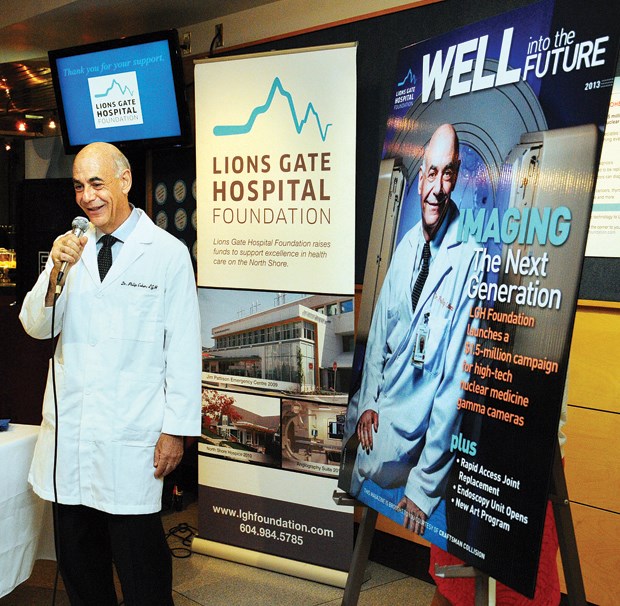The Lions Gate Hospital Foundation has launched a new campaign aimed at helping North Shore doctors make faster and more accurate diagnoses.
Their $1.5 Million Nuclear Medicine Campaign, announced earlier this month, will support the purchase of two state-of the-art-gamma cameras to be housed in the hospital's nuclear medicine department. Nuclear medicine uses radioactive substances to treat and diagnose patients, as well as to conduct research, according to the foundation. The new cameras, employing SPECT/CT (single photon emission computed tomography/computed tomography) technology, will replace diagnostic equipment that's more than a decade old and will be used in the diagnosis of cancers, heart disease,
diabetes complications, osteoporosis, neurological disorders and thyroid abnormalities.
Dr. Philip Cohen, division head of nuclear medicine at Lions Gate, has been working at the North Vancouver hospital for 30 years. Believing strongly in the need for new equipment, Cohen has committed to matching, one-to-one, all funds raised through the campaign until the goal is reached through his Pacific Nuclear Charitable Foundation, a private foundation he set up 20 years ago that primarily supports his department.
"It's hard for me to ask the community to support me if I'm not willing to put funds in as well," says Cohen, a Lower Lonsdale resident. He believes the campaign will have wide appeal. "Almost everybody who has heart disease, certain types of cancer, thyroid disease and any sort of dementia would very possibly wind up coming to our department for a diagnostic study," he says.
"Almost all of us are going to use the hospital. I've been sick here and if you're going to have to come in or have a family member that's really quite seriously ill, I think the name of the game is we support the community," he adds.
Cohen's department was last the focus of a foundation campaign approximately 10 years ago, which was also the last time they received any significant funding for their department, he says. According to guidelines issued by the Canadian Association of Radiologists, the diagnostic equipment they're using should be replaced every 10 years or so. "None of our equipment is less than 10 years old.
In fact, quite a bit of it is much older than that. We've reached a point where it needs to be replaced," says Cohen.
A common analogy he uses is, it's no different with their equipment than trying to use a cell phone or computer that's more than 10 years old.
"But we're expected to try to treat patients with equipment that's that same
vintage. So unfortunately it's time to replace it and we need to go to where the state-of-the-art is," he says.
Lions Gate is one of two Lower Mainland hospitals that aren't yet using the new technology.
The SPECT/CT technology used by the new cameras is a hybrid. "We're going to be combining our existing cameras with CT scanners, that's been probably the biggest change in our standard equipment in the last decade," says Cohen.
According to the foundation, a CT scan will capture the body's anatomical structures and a SPECT gamma camera will show how the body is functioning. The two scans will be merged and will produce a 3D image.
"We'll be able to see exactly where the abnormality is," says Cohen.
"It will be faster, it will be more accurate and we'll be able to just basically give much more detailed information to the referring doctors," he adds, particularly for surgeons.
Approximately 9,000 people were scanned in 2012, and the new equipment should allow for an additional 600 patients to be scanned annually.
As well, the new cameras will hopefully reduce the amount of radioactive tracer
given to a patient to get a good quality scan.
The campaign will also support a research component as Cohen is involved in the Medical Imaging Research Group based at the University of
British Columbia, headed by fellow North Shore resident Dr. Anna Celler.
"Without having the state-of-the-art equipment, we haven't been able to
do as much research as we would like to move the field forward," he says.
According to the group's website, members work to provide scientific support for clinical imaging and to develop new imaging techniques and their research covers different aspects of nuclear medicine imaging, including data acquisition and processing, image reconstruction, and data analysis and diagnostic support methods. "We think we can do really significant, new things, but it's very hard to do it without the equipment," says Cohen.
Lori Baker, a trauma nurse clinician at Lions Gate Hospital, is a strong supporter of the nuclear medicine campaign. Having been treated at the hospital for two illnesses - just prior to surgery in 2009 related to a breast cancer diagnosis and due to complications from whole body inflammation with post-lyme disease last year - the 59-year-old West Vancouver resident has experienced firsthand the need for high quality diagnostic equipment.
Having been a patient, Baker can't say enough good things about the nuclear medicine department staff, both their kindness, as well as their skill, expertise and attention to detail. "It opened my eyes because as a nurse, you'd think that you kind of are used to all these departments, but not this one. It was my own personal experience that really opened my eyes and heart to them and (I) thank them so enormously for everything they've done for me. It's really quite incredible," she says.
Cohen is incredibly grateful for the support of the foundation and local residents through the campaign. "We see ourselves as representing the community and trying to do the best we can to help the people of the North Shore," he says.
The campaign will end once the foundation has raised their desired funds, however they are hoping to wrap things up by the end of the year, says Cohen.
lghfoundation.com



